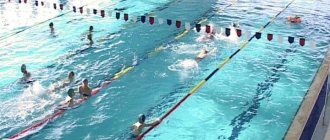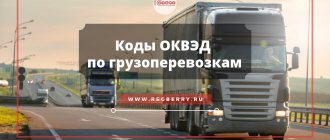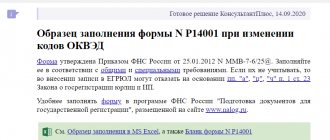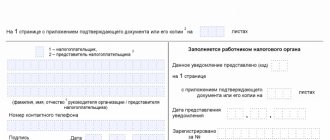When registering a business entity, regardless of its organizational and legal form, the types of activities according to OKVED that are planned to be carried out in the future must be indicated. In practice, there are often situations when an enterprise, in the process of work, comes to the need to start a new type of activity, and in this regard the question arises: is it possible to carry out activities without OKVED? This question is typical both for a one-time operation and for a complete transition to a new line of work.
Why is it necessary to register codes?
When submitting an application to the tax office for registration of an individual entrepreneur or a legal entity, the section about the types of economic activity that the entrepreneur intends to carry out must be filled out, so is it possible to carry out activities without OKVED - no, information about them is indicated when registering a new taxpayer.
Let's figure out why they are required and what they affect. There are several reasons to pay attention to them - for example, these codes depend on:
- professional risk class and insurance rate;
- application of various taxation systems. Not all types are suitable for special regimes.
According to the Civil Code of the Russian Federation, is it possible to engage in activities without OKVED - the answer is contained in Art. 49. A person has the right to engage in any work not prohibited by law. This norm is general, tax legislation contains special regulation, and the obligation to enter information is provided for by Federal Law No. 129-FZ “On State Registration of Legal Entities and Individual Entrepreneurs” dated 08.08.2001.
ConsultantPlus experts discussed how to make changes to the Unified State Register of Legal Entities in connection with changes in the OKVED code. Use these instructions for free.
Other consequences
Negative consequences may also arise in relations with counterparties. Most large companies will not enter into an agreement if they do not find the corresponding OKVED in the extract from the state register of a potential business partner. This is also relevant for participants in public procurement, where in some cases the customer may reject a participant’s application without the required type of activity.
The policy of many banks also provides for the analysis of information in the Unified State Register of Legal Entities of clients and the activities actually carried out by them. Often, receipt of funds for goods and services not provided for by the OKVED code of a company or entrepreneur can lead to demands to provide explanations for the transaction, or to blocking of transactions.
Thus, the answer to the question: is it possible to carry out activities without OKVED will be negative. The exception is a one-time transaction, the profit from which does not differ significantly from the usual account turnover. In all other cases, before starting a new line of work, it is necessary to make changes to the Unified State Register of Legal Entities.
Where should they be indicated?
Information about the selected types is contained in the registers of legal entities and individual entrepreneurs. The codes are indicated in the application for registration of an individual entrepreneur or organization and in the application for amendments to the Unified State Register of Legal Entities/Unified State Register of Individual Entrepreneurs when changing the types of labor. What should an entrepreneur do? Is it possible to conduct business if there is no OKVED, but the direction of work has changed? It is required to submit an application to the Federal Tax Service to change the codes within three working days (Clause 5, Article 5 of Federal Law No. 129-FZ of 08.08.2001). Since November 25, 2020, a new Order of the Federal Tax Service of Russia No. ED-7-14 / [email protected] dated August 31, 2020 has been in effect, which approves various application forms and requirements for document preparation. If the codes are changed, individual entrepreneurs submit an application on form No. P24001, legal entities - on form No. P13014.
Insurance premium rates
The first such “exceptional” case concerns a number of organizations and individual entrepreneurs that use the simplified tax system and conduct types of activities that give the right to apply reduced insurance premium rates. Such types of activities are listed in paragraphs. 5 p. 1 art. 427 Tax Code of the Russian Federation. These include, in particular, the activities of clothing production, specialized construction work, and the activities of sports clubs.
From the wording of this subclause it follows that the types of activities listed in it should be classified on the basis of activity codes in accordance with the All-Russian Classifier of Types of Economic Activities (OKVED).
This means that the code of the type of activity for which the policyholder applies a reduced tariff to payments for its employees must be entered in the Unified State Register of Legal Entities. However, it is not at all necessary that this code be declared as the main one. If the corresponding code is not in the Unified State Register of Legal Entities, but, despite this, the employer uses a reduced tariff in calculating insurance premiums, then at the next inspection, additional insurance premiums will be charged based on a different tariff.
It will be impossible to challenge the position of the tax authorities, since it is based on the letter of the law.
What is the fine for working without codes for legal entities and individual entrepreneurs?
Codes are information that is contained in registers provided for by law and is publicly available, but what are the risks of conducting business without OKVED, and how necessary is it to introduce new ones if the direction of work has changed? The Code of Administrative Offenses of the Russian Federation provides for the liability of an LLC for carrying out activities without OKVED (failure to provide or inaccurate presentation of information) in the form of a fine for officials from 5,000 to 10,000 rubles (Part 4 of Article 14.25 of the Code of Administrative Offenses of the Russian Federation).
Features of application:
- a fine is imposed for each code that is not specified, but was subject to entry into the register;
- the limitation period for attraction is 1 year, begins to be calculated from the end of the three-day period provided for by Federal Law No. 129-FZ for submitting information;
- does not apply to one-time transactions, but the nature of these transactions must be justified.
The Code of Administrative Offenses of the Russian Federation does not differentiate between the liability of individual entrepreneurs for activities without OKVED and organization; the fine amount is the same.
Extra OKVED codes - additional declarations
Declaring extra codes can also play a cruel joke on those who have transferred all their activities to paying UTII. Tax authorities may consider that in relation to those declared types of activities for which the “imputed” regime is not applied and for which activities are not carried out, the payer must submit “zero” returns for VAT and income tax (NDFL, if it is an entrepreneur).
If a company or individual entrepreneur has not fulfilled this obligation, then the inspectorate will punish for failure to submit such reports under Article 119 of the Tax Code of the Russian Federation: 1000 rubles for failure to submit each “zero” declaration. For a company, this amount may be insignificant, but if you take into account that the payer needs to submit several declarations per year (for example, four declarations for VAT), then the amount of sanctions becomes more significant. Especially if the tax authorities decide to fine you for three years at once.
In addition, we must not forget that failure to submit a declaration is a reason for blocking the account by the tax inspectorate (clause 1, clause 3, article 76 of the Tax Code of the Russian Federation). And such a suspension of work can be very inappropriate, and for some time become a significant obstacle to doing business.
It must be said that the position of the tax authorities regarding the obligation of the “imputed” person to file “zero” returns did not arise out of nowhere. The fact is that in this regard, both the Federal Tax Service of Russia and the capital's Federal Tax Service have already issued appropriate clarifications, which spoke of the emergence of such an obligation (letter of the Federal Tax Service of Russia dated April 26, 2011 No. AS-4-3/6753, Federal Tax Service of Russia for Moscow dated 03.03.2010 No. 20-14/022426).
It is noteworthy that the Ministry of Finance has the opposite opinion on this matter, which can be seen in letters dated July 17, 2012 No. 03-11-11/208, dated January 17, 2011 No. 03-02-07/1-9. They just believe that if a company (individual entrepreneur) conducts only those types of activities for which it pays UTII, there are no grounds for recognizing it as a payer of other taxes. Therefore, such “imputers,” according to the Ministry of Finance, are not required to submit VAT and income tax (PIT) returns to the tax office.
Thus, if any claims arise from the tax inspectorate, you can try to refer to these letters from the Ministry of Finance. But it’s better to submit zeros: this way you are guaranteed to protect yourself from possible problems. Or send the relevant question to your tax office and act based on the answer received from the inspectorate.
Fine for doing business not according to codes for organizations and individual entrepreneurs
Doing business not according to codes is also doing business without specifying the types; what is the threat if OKVED does not correspond to the type of activity? Carrying out a type of work that does not coincide with that declared in the register means that the individual entrepreneur or legal entity did not inform the tax authority about the change in the direction of work and perform it without the required code, therefore liability is applied according to 4 tbsp. 14.25 – from 5,000 to 10,000 rubles.
If the change is untimely, but reported, the fine for conducting activities not in accordance with OKVED is qualified under Part 3 of Art. 14.25 Code of Administrative Offenses of the Russian Federation - 5,000 rubles or a warning.
Occupational risk class
The following situation also concerns employers, but in the context of injury contributions. As is known, the rate of these contributions for the current calendar year is set depending on which class of professional risk the main type of activity of the insured belongs to.
So, if the policyholder is an organization, then it is obliged to confirm its main type of activity every year. If the company does not do this, it will have to pay contributions for injuries according to the tariff for the most dangerous type specified in the Unified State Register of Legal Entities (even if it has never maintained one). This directly follows from clause 13 of the Rules, approved. Decree of the Government of the Russian Federation dated December 1, 2005 No. 713.
It turns out that if during registration a company declared many codes “in reserve,” then if it forgot to confirm its main activity on time, this may result in an increase in its insurance burden.
Individual entrepreneurs - employers, unlike organizations, are not required to confirm their main type of activity. The Social Insurance Fund itself determines the rate of contributions for injuries for the type of activity that is indicated in the Unified State Register of Individual Entrepreneurs as the main one. Therefore, if the register lists as the main type of activity an activity with a higher risk class than the one that the individual entrepreneur actually conducts, then contributions for employees will definitely have to be paid at higher rates. So the codes declared in the register are important not only for organizations, but also for individual employers.
No OKVED codes - pay personal income tax
The following situation concerns entrepreneurs who want to switch to a patent tax system. The lack of a code in the Unified State Register of Enterprises for the type of activity for which they want to obtain a patent may prevent them from obtaining this very patent.
The fact is that, according to officials, an entrepreneur has the right to transfer his activities to PSN only for the type of activity that is indicated in the Unified State Register of Individual Entrepreneurs (letter of the Ministry of Finance of Russia dated May 16, 2013 No. 03-11-12/17092). If there is no corresponding code in the Unified State Register of Entrepreneurs, it must be entered there if the individual entrepreneur still intends to transfer his activities to the PSN.
Another situation is also relevant for citizens registered as individual entrepreneurs, but applies only to those who apply the simplified taxation system. Quite often questions arise as to what tax they should pay on certain income: “entrepreneurial” tax (tax under the simplified tax system at a rate, for example, 6% for the object “income”) or “personal” tax (personal income tax at a rate of 13%) ?
This question arises regarding the so-called “specific” income, that is, income from operations that are not directly related to the type of activity that the individual entrepreneur conducts. For example, a businessman operates in the field of trade. And then he decides to sell his property or gives someone money at interest. In both cases, income arises (income from the sale of your real estate, income from interest received, respectively). The question arises: what tax must be paid on such amounts?
In most cases, it will matter what codes were declared by the individual entrepreneur during registration. So, if the Unified State Register of Individual Entrepreneurs mentions the activity of providing loans for this entrepreneur, then the interest received by him should be taken into account as part of income during the simplification. If the register for this entrepreneur does not indicate the activity of providing loans, then income in the form of interest is no longer subject to the simplified tax system. Accordingly, personal income tax will be required to be paid on such income. And specifically in this case, the one who pays the income (tax agent) is obliged to pay tax. This conclusion follows from letters of the Ministry of Finance of Russia dated April 18, 2018 No. 03-11-11/25994, dated November 22, 2017 No. 03-04-06/77155, dated August 13. 2013 No. 03-11-11/32808. They say that income from the types of activities specified by the entrepreneur in the Unified State Register of Individual Entrepreneurs is recognized as income received from business activities.
With income from the sale of real estate, the situation is somewhat different. Although the presence of the corresponding code in the Unified State Register of Individual Entrepreneurs can be taken into account, the final decision is influenced by the fact that the property being sold is involved in business purposes. For example, if this is a store building in which the individual entrepreneur traded, or a non-residential building in which the premises were previously rented out by the entrepreneur, then the income from its sale is considered income from business activities. This means that it must be taxed within the framework of the appropriate regime - in this case, within the framework of the simplified tax system. This conclusion is confirmed by judicial practice (see, for example, the ruling of the Supreme Court of the Russian Federation dated June 16, 2017 No. 304-KG17-7241).
Requirements for the use of activity codes
Each legal entity (hereinafter referred to as LLC) or individual entrepreneur (hereinafter referred to as individual entrepreneur), when registering with the tax authority, has a mark in the register about the declared type of activity. If the required forms are not completed in accordance with the requirements, state registration may be denied. Therefore, it is impossible to say that OKVED does not exist at all, but activities are ongoing.
The words “activity without OKVED” mean two options: either the direction of work changed or was added, but the tax authorities did not consider it necessary or forgot to notify about this.
Let us note that the liability of individual entrepreneurs for the above-mentioned inconsistencies with the code occurs less frequently and is not as daunting as for similar cases with legal entities. If an entrepreneur is not an employer, works only with Russian contractors, and does not take part in tenders and competitions, then this probability tends to zero. It is difficult to say how this is explained, because the requirements of Federal Law No. 129 of August 8, 2001, paragraph 5, subparagraph 5 are the same for all participants in economic activity. Probably, the workload of tax workers and the lack of physical ability to control all working entrepreneurs play a role here. Be that as it may, individual entrepreneurs can feel calmer and more confident than legal entities.
Along with the general mass of individual entrepreneurs, there are those who are advised to exercise caution and prudence when filling out information for tax authorities and various funds:
- Employers who use hired labor are required to pay insurance premiums for subordinates. One of the bases for accrual is injury; its presence and the magnitude of the probability directly depend on the type of work or service.
- Application of the UTII taxation regime. It applies only to specific activities listed in the legislation.
- Foreign economic activity is completely controlled by the state, since we are talking about currency transactions and the export (import) of goods. Participants in such relations, regardless of their form of ownership and number, must regularly submit accounting and financial documents to regulatory authorities.
- Participation in tenders or competitive deliveries (purchases). As in the previous paragraph, organizations declaring a desire to take part in such procedures provide information about the type of activity, with mandatory further verification.
There are no problems adding the code to the Unified State Register of Legal Entities or the Unified State Register of Individual Entrepreneurs; it is easy and quick to do.









